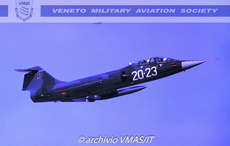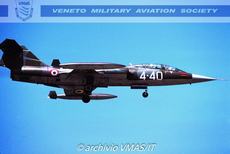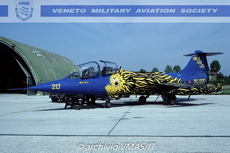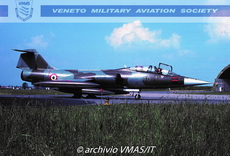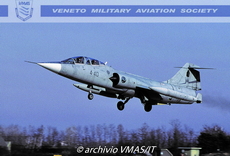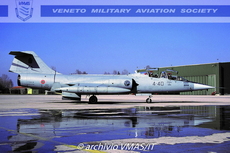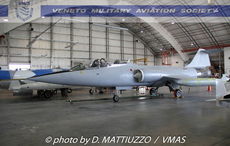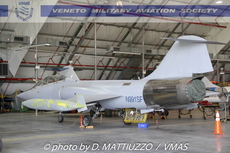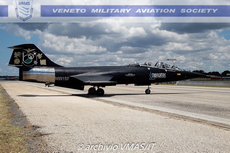Costruito
dalla Lockheed, col numero di costruzione 5209, fu consegnato all'
Aeronautica Militare ad ottobre del 1969; l'anno successivo fu consegna
al 20° Gruppo Autonomo sulla base di Grosseto.
Compito del 20° Gruppo era di addestrare i piloti sul velivolo F-104, da poco entrato in servizo operativo.
Alla consegna ebbe assegnato il numero distintivo 20-23;
alla fine degli anni settanta, il 20° Gruppo fu incorporato nel 4°
Stormo Caccia ed il numero distintivo fu modificato in 4-40.
Nel 1991 ricevette una livrea commemorativa per celebrare le
75.000 ore di volo effettuate dai TF-104 dell' Aeronautica Militare.
Ritornato alla consueta colorazione mimetica, i numeri
distintivi furono modificati nella nuova variante a bassa visibilità.
Nel 1997 subì un'aggioramento dell' avionica allo standard G-M
per renderlo più simile ai velivoli di prima linea; con l'occasione
sulla coda fu dipinto un motivo a forma di fulmine che includeva una M
stilizzata.
Nel 2000 ricevette la nuova colorazione in grigio chiaro uniforme, comune a tutti i velivoli della Forza Armata.
Con la dismissione del' F-104, anche questo velivolo fece gli ultimi voli nell' ottobre 2004.
La Starfighters International Inc., azienda basata in Florida,
che già operava dei CF-104 ex canadesi, acquistò diverse delle macchine
italiane dismesse per un nuovo utilizzo in ricerche aerospaziali su
incarico della NASA.
Per questo tipo di ricerche, le caratteristiche di volo dell' F-104 sono particolarmente apprezzate.
La MM54258 è stata iscritta nel registro civile USA con le nuove
marche N991SF ed è stto ridipinto con un'accattivante livrea
nero/metallo naturale.
Per il Centenario dell' Aeronautica Militare, con la fattiva
collaborazione della 46ª Brigata Aerea, il velivolo è stato riportato
in Italia per partecipare alla Manifestazione del Centenario (  ) , in occasione della quale la coda è stata decorata con disegni a celebrazione dell' avvenimento. ) , in occasione della quale la coda è stata decorata con disegni a celebrazione dell' avvenimento.
Di seguito una carrellata di immagini che, in ordine
cronologico, illustrano la vita del velivolo dai primi anni fino alla
Manifestazione del Centenario
testo di R. Zambon
|
|
Built by Lockheed, with construction number 5209, she was delivered to the Aeronautica Militare in October 1969; the following year it was delivered to the 20th Gruppo Autonomo based in Grosseto.
The task of the 20th Gruppo was to train the pilots on the F-104
aircraft, which had recently entered operational service.
Upon delivery he was assigned the distinctive number 20-23; at
the end of the seventies, the 20° Gruppo was incorporated into the 4°
Stormo Caccia and the distinctive number was changed to 4-40.
In 1991 it received a commemorative livery to celebrate
the 75,000 flight hours performed by the Aeronautica Militare TF-104s.
Returning to the usual camouflage colouring, the distinctive numbers
were changed to the new low visibility variant.
In 1997 it underwent an avionics upgrade to G-M standard to make it more similar to front-line aircraft; on the occasion, a lightning bolt motif was painted on the tail that included a stylized M.
In 2000 it received the new plain light gray color scheme, common to all aircraft of the Aeronautica Militare.
With the decommissioning of the F-104, this aircraft also made her last flights in October 2004.
Starfighters
International Inc., a company based in Florida, which already operated
former Canadian CF-104s, purchased several of the decommissioned
Italian machines for new use in aerospace research on behalf of NASA.
For this type of research, the flight characteristics of the F-104 are particularly appreciated.
MM54258 has been registered in the US Civil Registry under the
new numbers N991SF and has been repainted in an attractive
black/natural metal livery.
For the Centenary of the Air Force, with the active
collaboration of the 46th Brigata Aerea, the aircraft returned
back to Italy to participate in the Centenary Event (  ), on the occasion of which the tail was decorated with drawings to celebrate the event . ), on the occasion of which the tail was decorated with drawings to celebrate the event .
Below
is a series of images which, in chronological order, illustrate the
life of the aircraft from the early years up to the Centenary Event
text ad english translation by R. Zambon
|


